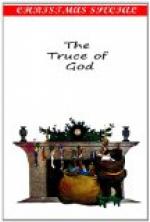Charles eyed him with feverish eyes.
“Truce of God,” he said, sulkily, from across the moat. And then: “We seek a runaway, the child Clotilde.”
“I shall make inquiry,” said Philip, veiling the twinkle under his heavy brow. “In such a season many come and go.”
But in his eyes Charles read the truth, and breathed with freer breath.
They lowered the drawbridge again with a great creaking of windlass and chain, and Charles with his head up rode across. But his men-at-arms stood their horses squarely on the bridge so that it could not be raised, and Philip smiled into his beard.
Charles dismounted stiffly. He had been a night in the saddle and his horse staggered with fatigue. In Philip’s courtyard, as in his own, were piled high the Christmas tithes.
“A good year,” said Philip agreeably, and indicated the dues. “Peaceful times, eh, cousin?”
But Charles only turned to see that his men kept the drawbridge open, and followed him into the house. Once inside, however, he turned on Philip fiercely.
“I am not here of my own desire. It appears that both my wife and child find sanctuary with you.”
“Tut,” said Philip, good-naturedly, “it is the Christmas season, man, and a Sunday. We will not quarrel as to the why of your coming.”
“Where is she?”
“Your wife or Clotilde?”
Now all through the early morning Charles had longed for one as for the other. But there was nothing of that in his voice.
“Clotilde,” he said.
“I shall make inquiry if she has arrived,” mumbled Philip into his beard, and went away.
So it came about that Charles was alone when he saw the child and caught her up in his hungry arms. As for Clotilde, her fear died at once in his embrace. When Philip returned he found them thus and coughed discreetly. So Charles released the child and put her on her feet.
“I have,” said Philip, “another member of your family under my roof as to whom you have made no inquiry.”
“I have secured that for which I came,” said Charles haughtily.
But his eyes were on Philip and a question was in them. Philip, however, was not minded to play Charles’ game, but his own, and that not too fast.
“In that event, cousin,” he replied, “let the little maid eat and then take her away. And since it is a Sunday and the Truce of God, we can drink to the Christmas season. Even quarrelling dogs have intervals of peace.”
So perforce, because the question was still in his heart if not in his eyes, Charles drank with his cousin and enemy Philip. But with his hand in that small hand of Clotilde’s which was so like her mother’s.
Philip’s expansiveness extended itself to the men-at-arms who still sat woodenly on the drawbridge. He sent them hot liquor, for the day was cold, and at such intervals as Charles’ questioning eyes were turned away, he rubbed his hands together furtively, as a man with a secret.




